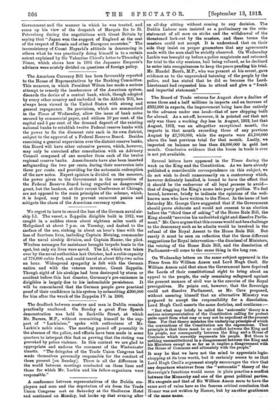On Wednesday letters on the same subject appeared in the
Times from Sir William Anson and Lord Hugh Cecil. Sir William Anson said that since the Government have deprived the Lords of their constitutional right to bring about an appeal to the people, the only remaining safeguard against the present menace of civil war is the exercise of the Royal prerogatives. He points out, however, that the Sovereign could not dissolve Parliament, as Mr. Cave proposed, without assuring himself that an alternative Ministry was
piepared to accept the responsibility for a dissolution. Lord Hugh Cecil asserts the same doctrine, and continues :— "But what may briefly be called the 'automatic' theory is a serious misrepresentation of the Constitution calling for protest quite apart from what may or may not be expedient atthe present time. For that theory mistakes the underlying principle of which the conventions of the Constitution are the expressions. That principle is that there must be no conflict between the King and his people, nor consequently between the King and a House of Commons which correctly represents his people. Bat there is nothing imeonstitutional in a disagreement between the King and his Ministers except in so far as it implies a. disagreement with the House a Commons and ultimately with the people."
It may be that we have not the mind to appreciate logic- chopping at its true worth, but it certainly seems to us that Lord Hugh Cecil's argument simply encourages the view that any departure whatever from the "automatic" theory of the Sovereign's functions would mean in plain practice a eonfliet between the Monarchy and one of the great political parties!. His exegesis and that of Sir William Anson seem to have the same sort of value here as the famous critical conclusion that Homer was not written by Homer, but by another gentleman of the same name.










































 Previous page
Previous page